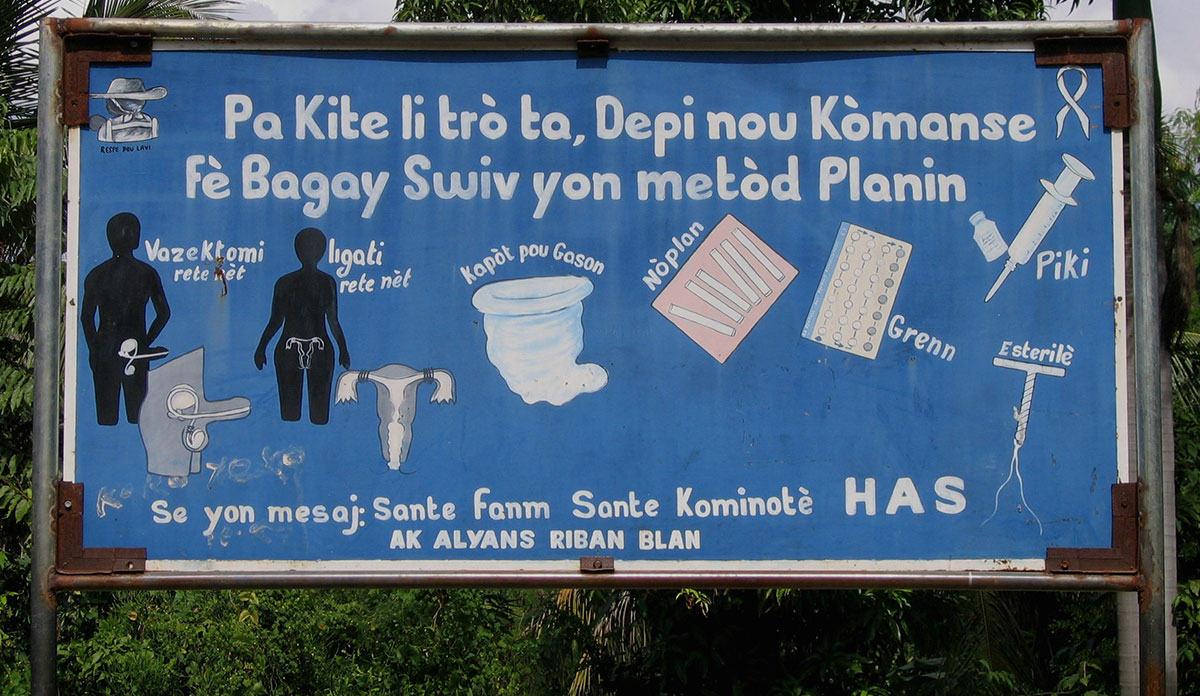I was in a delivery room in rural Haiti and a mother of four young children was hemorrhaging on the bed in front of me. Her older sister, a mother of three well beyond her young years, had ensured that she arrived at this clinic supported by the NGO that I founded and currently run, Circle of Health International (COHI). This young mother, a few breaths from death, had used a stick to abort her seventh pregnancy. She did not want another child; her family could not afford another child. The Haitian midwives caring for her have a tough line to tow: they work in a maternity clinic supported mostly by anti-choice Christian churches in America. They encounter thousands of American tourists each year who come to pray over the women they care for, offering too much judgement and not enough autonomy. These smart, capable, professional midwives want to offer what is truly needed: family planning and a space where women can freely, without judgement, get the care that they are asking for: help in spacing and timing their pregnancies according to their own wants and needs.
My job as a public health professional, as a midwife, and as a human, is to do no harm to those that ask for health care. My job is to get every woman, every child, the care they need to determine their own destiny, their own path. My job is not to judge, but to support and provide quality, accessible healthcare to keep mothers and children safe . Because a donor like COHI is on the scene at this maternity clinic, the Haitian midwives can offer oral contraception to the women who deliver here. But, they must do so quietly, so as not to upset the other donors who may not be in support of birth control. Abortions happen, not here at this clinic, but elsewhere in Haiti as they do everywhere. These kinds of abortions are dangerous and there is a tremendous stigma.
This is the messy daily reality of international reproductive health programming. It’s not neat and tidy and often smells badly. And it always, always, involves conversations and real time decisions about abortions.
US foreign policy’s toying with the reproductive fate of women and girls living outside of the US is not new to this century.
As new Presidents do, Donald Trump is expected to take action by declaring his intentions for women’s reproductive health stance immediately upon his arrival into the White House in January. This will have dire and immediate consequences for women worldwide. I believe that Trump will likely reinstate the Mexico City Policy — or as it’s known in the health community, the Global Gag Rule — a Reagan-era policy prohibiting groups receiving U.S. aid from providing abortions, or even counseling patients about the procedure. Doing so will force millions of women’s health clinics to close, thereby decreasing access to essential contraception and in turn leading to an increase in unsafe abortions around the world.
U.S. foreign policy’s toying with the reproductive fate of women and girls living outside of the US is not new to this century. The allocation and deployment of US state sanctioned funds to pay for abortions has been illegal since the Helms amendment was enacted in 1973. Therefore, Non-Governmental Organizations that accept U.S. aid are required to use their own funds on abortion related services.
President Ronald Reagan enacted the Mexico City Policy in 1984. It has since become a tradition for incoming presidents of opposing parties to declare their support or opposition to this policy as one of their first acts of office. President Bill Clinton revoked it right after taking office; President George W. Bush reinstated it shortly after his inauguration; and President Barack Obama once again revoked the policy as soon as he entered the White House. President Trump will likely revoke this policy in his first days in office, negatively impacting hundreds of millions of women around the world who didn’t have the opportunity to vote for him as they are not U.S. citizens, thereby reducing access to safe abortions and the family planning that helps in preventing them.
A reduction of access to safe abortions can have serious health consequences, but one doesn’t have to outlaw abortions to limit one’s access to what women need to determine their own fate. What difference has the Global Gag rule made in the lives of real women around the world?
Evidence shows that the impact of the Global Gag rule has limited access to contraception and thereby led to an increase in abortions . One example of this evidence is in the 2011 study at Stanford University that compared pre- and post-Bush policy abortion rates in sub-Saharan Africa.
The International Food Policy Research Institute released a study in 2015 that found that the Planned Parenthood Association of Ghana closed several sites that provided family planning as a result of the mandate of the Bush policy. In the aftermath, an increase in unwanted pregnancies in Ghana was observed — with one in five of those pregnancies ending in abortion.
PAI provided a report that found that 22,000 women die and 8.4 million suffer serious illness or injury after undergoing an unsafe abortion. These deaths and injuries are preventable — all it takes is expanding access to family-planning services and ensuring that they are affordable.
The U.S. is the biggest state donor in the world for women’s health in developing countries . This puts the US in a powerful position to support the reduction in stigma around abortion around the world, should that be the position we decide to take. This can be carried out in many different ways, one of which being the protection of funding for family planning and the education of girls, both known to reduce the number of unplanned and unintended pregnancies. It seems likely that Trump will undo much of the advancements made to protect and promote women , girls, and their health. When Trump reinstates the Global Gag Rule millions of women’s lives will be in danger as they face a reality that does not provide the health care that they will need to chart their own reproductive course.
Featured Image: A billboard shows family planning methods near the Plassac Health Clinic run by HAS (Hôpital Albert Schweitzer) in rural Haiti. © 2008 Margaret F. McCann, Courtesy of Photoshare.














